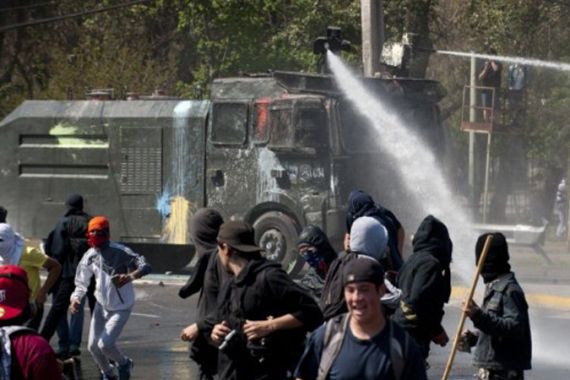Chile education talks begin amid protests
Students and government leaders begin negotiations, while thousands of protesters challenge police in the streets.

Student protest leaders have begun long-awaited negotations with the government on education reforms, as tens of thousands of demonstrators took to the streets in a massive protest in the Chilean capital.
Riot police used tear gas and water cannon on Thursday to try to disperse the protesters, some of whom responded by attacking security forces with sticks and rocks, Chilean television reported.
Keep reading
list of 4 items‘Triple spending’: Zimbabweans bear cost of changing to new ZiG currency
‘We share with rats’: Neglect, empty promises for S African hostel-dwellers
Thirty years waiting for a house: South Africa’s ‘backyard’ dwellers
Tear gas wafted into private homes and office buildings in the area, briefly causing panic among residents around a park where the clashes occurred.
The demonstration had begun peacefully in front of the University of Santiago, but turned violent near a park south of the Chilean capital, outside an area that authorities had approved for the march.
Organisers estimated the crowd at 90,000, saying participants included university students, secondary school students and teachers.
The police gave no estimate for the number of demonstrators.
Camila Vallejo, one of the leaders of the student movement, denounced the police handling of the latest protest.
“Police should have cooperated to control the protest, but not suppress it,” she said.
Differences remain
Officials said the two sides talked for more than two hours and agreed to meet again on Wednesday to discuss student demands that the government provide free public education.
Giorgio Jackson, a representative for university students, said only that the “meeting was complex.”
Strong differences remained over the government’s insistence that students return to classrooms, a demand that student leaders have rejected.
Student leaders said they would be calling for no classes to be held while the talks are ongoing, to maintain pressure on the government.
President Sebastian Pinera, however, has warned that students could lose their scholarships and place in school if classes do not resume.
“We’re not going to do favours for those who don’t return to their campuses,” said Education Minister Felipe Bulnes, who participated in the negotiations.
Classes have been on hold in many schools and universities after nearly five months of strikes and demonstrations, which have routinely drawn tens of thousands of students into the streets, representing the largest protest movement in Chile since General Augusto Pinochet’s military dictatorship ended in 1990.
Later in the day, Pinera said the 2012 budget includes $11.65 billion for education. He said that represented a 7.2 per cent increase compared with a 5 per cent rise for the total budget.